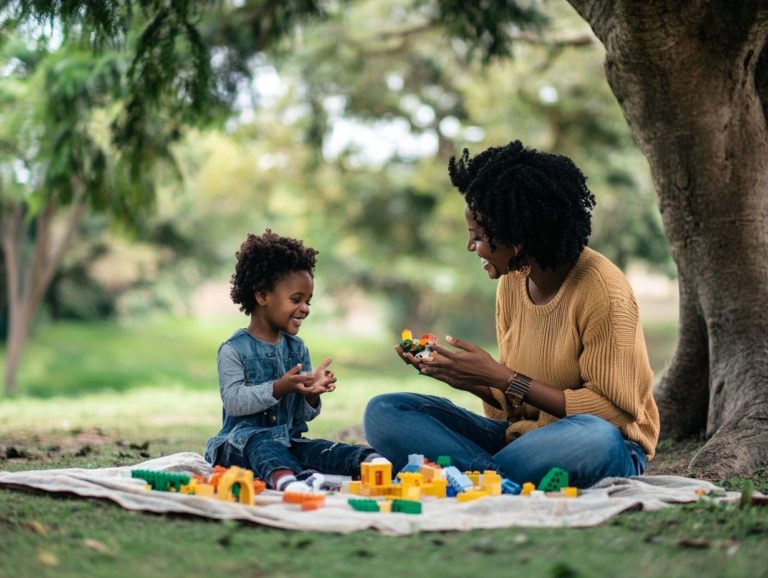How to Engage in Active Listening
Active listening transcends mere hearing; it s about forging deeper connections with others.
This article delves into the myriad benefits of active listening. It offers effective techniques and strategies to refine your skills, highlights common barriers that may obstruct your ability to listen, and equips you with tips to overcome them.
Whether in personal relationships or professional settings, mastering active listening can transform your interactions and cultivate meaningful connections.
Embrace the journey of unlocking the profound power of truly understanding one another.
Contents
Key Takeaways:

Active listening is an essential skill for building strong relationships and fostering effective communication. Key techniques for practicing active listening include maintaining eye contact, asking clarifying questions, and summarizing what you’ve heard. Common barriers include distractions, biases, and lack of empathy, but these can be overcome with awareness and effort.
The Importance of Active Listening
Active listening is a vital communication skill that provides emotional support and forges personal connections in both personal and professional realms. Be fully present. This means understanding both the words and the emotions behind them.
By sharpening your active listening skills, you ll unlock new levels of communication, fostering deeper empathy and understanding. This enables you to tackle challenges like social anxiety more adeptly.
Research from respected sources such as MindTools and Verywell Mind underscores the significance of listening techniques in facilitating successful conversations and nurturing therapeutic relationships.
Understanding the Benefits
Understanding the benefits of active listening is crucial for elevating your communication and relationships in various contexts. When you engage in active listening, you create a safe environment that nurtures trust and openness, paving the way for deeper connections.
This attentive approach reduces misunderstandings and provides emotional support that can transform your interactions. By genuinely hearing what others are saying, you cultivate greater empathy, leading to more compassionate responses in conversations.
As your communication becomes more effective, your relationships both personal and professional improve significantly, ultimately enhancing teamwork and emotional bonding.
This crucial skill helps you resolve conflicts quickly and effectively, making it essential in any conversation!
Practicing Active Listening
Practicing active listening means embracing specific techniques and strategies that transform you into an attentive listener. This involves utilizing non-verbal cues, posing open-ended questions, and reflecting on what you hear.
Each of these elements enriches your conversations, leading to more meaningful and impactful exchanges.
Key Techniques and Strategies

Key techniques and strategies for active listening include being attentive to non-verbal cues, asking open-ended questions, and practicing reflective listening. These methods are essential for effective communication, allowing you to genuinely connect with others.
For instance, when you pay attention to non-verbal cues like body language and facial expressions you gain valuable insights into a person’s emotions and thoughts, often revealing more than words ever could.
Open-ended questions are your allies in fostering deeper discussions. Instead of leading to a simple yes or no, they encourage others to elaborate and share their feelings or experiences.
Engaging in reflective listening enables you to paraphrase or summarize what has been said, confirming your understanding and validating the speaker’s perspective.
By incorporating these techniques into your daily conversations, you can cultivate more meaningful and engaging dialogue.
Barriers to Active Listening
Barriers to active listening can disrupt your connections. It s crucial to tackle these obstacles now to improve your communication skills in a range of settings, from personal relationships to workplace dynamics.
Social anxiety, distractions, and the inclination to withhold judgment can all hinder your ability to listen actively. To enhance your communication skills, it becomes vital to recognize and tackle these obstacles head-on.
By doing so, you can foster deeper connections and facilitate clearer interactions in both your personal and professional life.
Common Obstacles and How to Overcome Them
Common obstacles to active listening include distractions, preconceived notions, and emotional barriers. However, you can employ effective techniques and strategies to overcome them.
These challenges hinder effective communication. You can enhance your listening skills with simple methods.
For instance, minimizing background noise or using active engagement techniques, like nodding and summarizing, can dramatically improve your concentration. By suspending judgment and approaching conversations with an open mind, you can dismantle the preconceived beliefs that often cloud your understanding.
Emotional barriers are also manageable through self-awareness exercises. These allow you to identify and regulate your feelings, ultimately leading to more productive interactions.
By employing these actionable strategies, you can foster deeper connections and elevate your overall communication skills.
Improving Your Active Listening Skills
Enhancing your active listening skills is a transformative journey that significantly elevates your communication abilities in both personal and professional spheres.
By engaging with therapy and mental health resources, you can foster this improvement, cultivating effective listening techniques that not only promote emotional support but also deepen understanding in your interactions.
Tips for Becoming a Better Listener

To become a better listener, let s dive into practical tips that will elevate your active listening skills and overall communication.
This journey begins with maintaining eye contact and creating a welcoming environment, fostering trust and encouraging open dialogue.
Practicing reflective listening can significantly enhance your understanding. By paraphrasing what the speaker has said, you clarify points and demonstrate genuine interest.
Minimizing distractions whether from electronic devices or background noise allows the conversation to flow seamlessly.
Be mindful of non-verbal cues, such as gestures and facial expressions. These provide valuable context and enhance the connection between you and the speaker, leading to more effective and meaningful exchanges.
Applying Active Listening in Different Settings
Applying active listening techniques in various contexts whether in personal relationships or professional settings is essential for nurturing deeper connections and enhancing effective communication.
In your personal relationships, utilizing the strength of active listening can significantly reduce social anxiety and foster greater understanding.
In the professional realm, it paves the way for improved collaboration and innovative problem-solving, ultimately transforming interactions into more productive exchanges.
In Personal Relationships
In personal relationships, active listening stands as a cornerstone for fostering empathy and delivering emotional support. This ultimately strengthens the bonds you share with others.
This practice involves immersing yourself in what someone is truly expressing, transcending the mere act of hearing their words. By tuning into the speaker’s emotions and body language, you communicate understanding and validation, ensuring the other person feels genuinely heard.
During times of distress, this level of attentiveness can offer vital reassurance and comfort. Relationships flourish when partners share their feelings openly, and the presence of authentic active listening creates a safe space where vulnerability can thrive.
This reciprocal exchange not only deepens emotional intimacy but also builds trust, laying a robust foundation for healthy, enduring connections.
In Professional Environments
In professional environments, active listening is vital for effective communication among colleagues.
When you engage in active listening, you cultivate an atmosphere where ideas flow freely and every voice is valued. This practice enhances teamwork and promotes collaboration, making individuals comfortable sharing their thoughts and concerns.
The ability to genuinely hear and understand differing viewpoints is crucial for conflict resolution. It allows teams to proactively address issues instead of simply reacting to them.
By prioritizing active listening, you contribute to a supportive culture that encourages innovation and drives overall success.
Frequently Asked Questions

What is active listening and why is it important?
Active listening is a communication technique where the listener fully concentrates on what the speaker is saying. It involves understanding both the content and the emotions behind it. Active listening is important because it builds strong relationships, improves understanding, and fosters mutual respect.
How can I practice active listening?
To engage in active listening, maintain eye contact and nod your head. Use verbal and body language signals to show you are listening. Ask clarifying questions, summarize what the speaker has said, and avoid distractions while the other person speaks.
What are some common barriers to active listening?
Some common barriers to active listening include distractions from your own thoughts, ignoring body language signals, interrupting the speaker, and holding preconceived opinions about the topic or speaker.
How can I overcome these barriers?
To overcome these barriers, try to be fully present in the conversation. Listen without judgment and focus on the speaker’s words rather than your own thoughts. Avoid interrupting and make an effort to understand the speaker’s perspective.
Can active listening help in resolving conflicts?
Yes! Active listening is a powerful tool for resolving conflicts. By fully understanding the other person’s perspective and emotions, you can defuse situations and find mutually agreeable solutions. It also helps build trust and mutual respect, essential for conflict resolution.
How can active listening improve my personal and professional relationships?
You ll be amazed at how active listening can transform your relationships! It fosters open communication, deepens understanding, and builds trust and respect. It also helps you avoid misunderstandings, improve empathy, and strengthen your overall communication skills.






